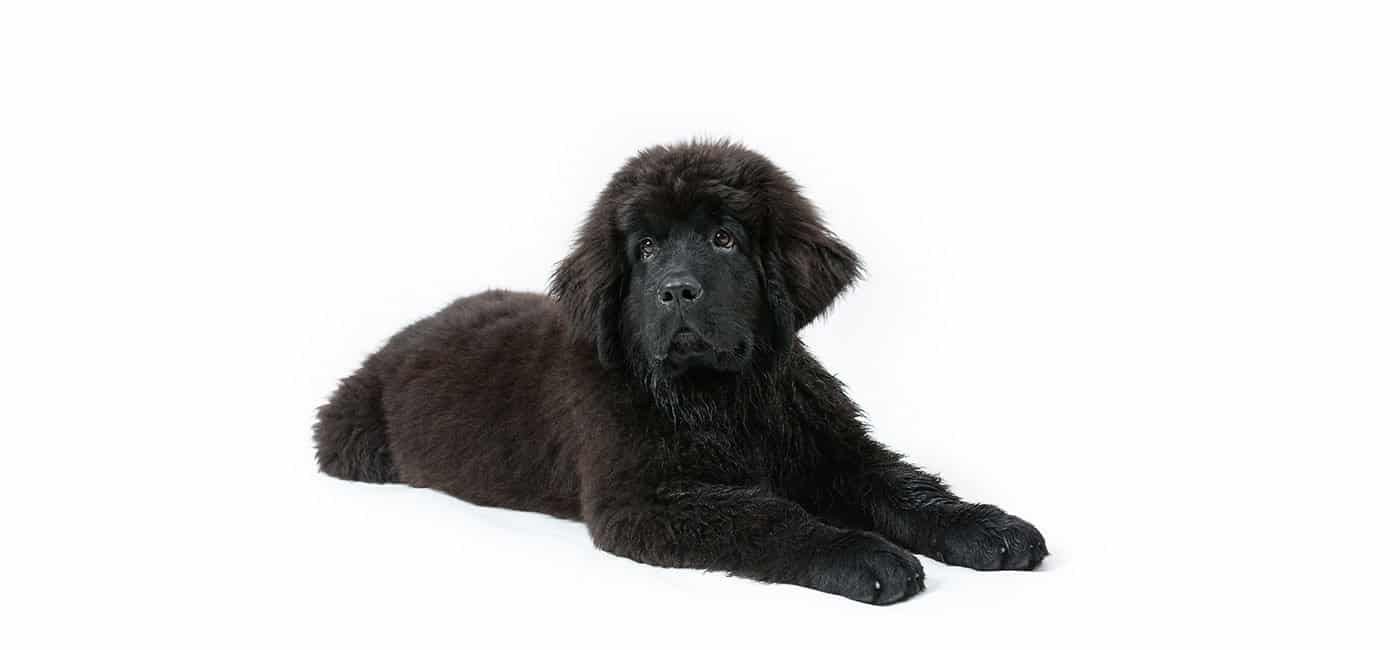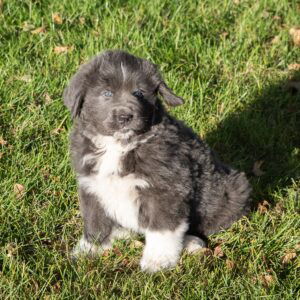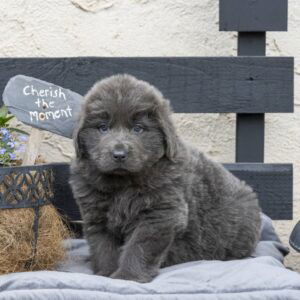Sorry, no puppies of this breed are currently available. Contact us to be notified when more are listed for adoption.
Have a question about our Newfoundland puppies?
"*" indicates required fields
overview of the Newfoundland Dog Breed
Are you looking for a large, patient dog that is affectionate yet protective?
Take a look at our Newfoundland puppies for sale below!
Newfoundlands are a giant breed known for their gentle and sweet temperament. Newfoundlands are affectionate, patient, powerful, and have life-saving instincts. Bred to work with and rescue Canadian fishermen on the island of Newfoundland, this breed loves water and working with their owners.
If you have the space for this large, loveable breed, the Newfoundland is an excellent family companion and watchdog!
Adopt your Newfoundland puppy today and experience the joy of this loyal, affectionate, and strong companion!
You can also browse our other available puppy breeds if you are interested.
Newfoundland temperament
Sweet Temperament: Newfoundlands bring a calm and steady presence with them. They are patient, gentle, loving, and affectionate.
Watchful: Newfoundlands, although friendly, have a protective nature. Not only do they have an intimidating presence and loud bark, but they are courageously devoted to their humans and keep a watchful eye on them.
Social and Friendly: Newfoundlands are typically friendly dogs that get along well with people, other dogs, and even other animals. They tend to be sociable and enjoy making new friends.
Drooler: Yes, Newfoundlands drool a lot. You’ll want to keep a towel nearby to wipe their mouths, especially after they eat or drink.
Loyalty: Newfoundlands are known for their loyalty and dedication to their families. They are often deeply attached to their owners and thrive on being part of the family unit.
Giant Breed: When adopting a giant breed such as the Newfoundland, consider the commitment carefully. This breed will cost more to feed, have larger vet bills, and need more living space. Training Newfoundlands is especially important. A 150-pound dog that pulls on its leash or jumps up on people isn’t just annoying; it can be dangerous!
Strong Swimmer: Newfoundlands were bred for swimming – and rescuing drowning people. Newfoundlands don’t swim doggy-paddle style like other breeds – they have a special breaststroke which makes them extra powerful swimmers!
Newfoundlands make wonderful companions for families and individuals who appreciate their gentle nature, loyalty, and love for human interaction. Keep in mind their grooming needs and the potential for drooling due to their large jowls. Providing them with plenty of love, attention, and care will ensure a happy and harmonious relationship.
Newfoundland Breed history
The Newfoundland is a very ancient breed. In fact, it’s said to date back to the Vikings! Some sources say it has ancestry from the American Black Wolf (now extinct).
In the 1700s, the fishermen used the Newfoundland as a working dog and a companion. Why were Newfoundlands the perfect dog for these fishermen?
Newfoundlands have thick coats which keep them warm (and waterproof) when dragging a fish net to shore – or even saving someone’s life. That’s right, Newfoundlands are not only excellent swimmers, but they are strong enough to save a drowning person!
In addition to being companions, bringing in nets, and water rescues, Newfoundlands were also used to cart their owner’s catch into the village.
Newfoundlands have a strong instinct to rescue, and they are calm, loyal, and affectionate companions.
Explorers Lewis and Clark had a Newfoundland named Seaman travel with them for the entire trip.
Lord Byron had a beloved Newfoundland called Boatswain. He wrote a poem about Boatswain and had a large moment built for his dog. On the monument is an inscription written by Lord Bryon:
“Who possessed Beauty without Vanity
Strength without Insolence
Courage without Ferocity
And all the Virtues of Man without his Vices.”
President James Buchanan had a Newfoundland in the White House named Lara.
Perhaps the most famous Newfoundland is “Nana” from Peter Pan. “Nana” is hired as a nanny to care for Wendy, John, and Michael Darling.
Newfoundlands also appear in the classic book Jane Eyre by Charlotte
Bronte.
With admirable traits and abilities, the Newfoundland is one of the most beloved breeds in history.
The Newfoundland was registered by the AKC in 1886 and ranks forty out of all breeds registered with AKC.
A few breeds that are similar to Newfoundlands include Bernese Mountain Dogs, Greater Swiss Mountain Dogs, and Saint Bernards.
Newfoundland Average size
A male Newfoundland measures 28 inches tall at the shoulder and weighs 130-150 pounds, and a female Newfoundland measures 26 inches tall at the shoulder and weighs 100-120 pounds.
As with any large or giant breed, a Newfoundland will need more space, more dog food, larger medication dosages, etc., than other dog breeds. Please consider the space, cost, and time required to care for a Newfoundland before adopting! Here are nine things you should know before adopting a Newfoundland.
Average Newfoundland lifespan
Newfoundlands usually live 9-10 years.
Newfoundland body features
Newfoundlands have thick, curly, oily hair. Their coats are often black, brown, gray, or white and black.
Newfoundlands are known for their massive size: 100-150 pounds! They have thick double coats, hanging ears, and huge, boxy heads.
grooming Your Newfoundland Puppy
Newfoundlands have lovely, thick coats that will need a thorough brushing a few times a week to prevent matting. They have medium-length hair and are moderate to heavy shedders.
Newfoundlands also have a bit of an oily coat. This means you may find oily marks on your dog’s bed or your furniture. It’s recommended that you bathe your Newfoundland once a month. Bathing more often than this could strip the coat of its natural oils.
Plan to take your Newfoundland to the groomer a few times a year for a trim. Learn more about grooming a Newfoundland here.
Newfoundlands are also droolers, so keep a towel nearby to wipe their mouths often and especially after eating or drinking.
Check your Newfie’s ears regularly for ear infections.
Your Newfoundland will also need its teeth brushed and nails trimmed regularly.
Keeping Your Newfoundland Puppy Healthy
There are a number of health conditions that can affect Newfoundlands. While not every Newfoundland gets these conditions, it’s essential for owners to be aware of them.
Hip and Elbow Dysplasia
Because of their large size, Newfoundlands are especially at risk for hip and elbow dysplasia, two of the most common health issues in dogs.
Hip and elbow dysplasia occurs when the thigh bone doesn’t fit snugly into the hip and can result in limping, lameness, or arthritis if it’s not addressed. Hip and elbow dysplasia can be genetic, or it can be caused by environmental factors such as overeating or injuries.
Here are some ways to prevent hip dysplasia in your puppy:
- Ask the breeder for an OFA (Orthopedic Foundation for Animals) Hip Clearance. Dogs with hip dysplasia shouldn’t be bred.
- Talk to your vet about the right food for your puppy and stick to the correct amount to prevent unhealthy growth.
- Keep your puppy from running or jumping excessively on hard surfaces and from standing on their hind legs.
- Keep your Newfoundland a healthy weight. Obesity increases the chance of structural issues.
Protect Your Newfoundland From Obesity
Whatever dog breed you own, you can protect your dog from one of the most common health problems: obesity. One of the best ways to extend your dog’s life is by feeding them the correct amount of food and giving them adequate exercise.
Bloat, A Life-Threatening Condition
Bloat, also called gastric dilatation-volvulus or gastric torsion, can affect any large breed dog and is a life-threatening condition.
Bloat is when the stomach becomes twisted, and the gases in the stomach are unable to escape. The pressure from these gases affects the blood flow to the heart, and it can be fatal.
- Avoid feeding your dog right before or after heavy exercise.
- Feed them a few smaller meals a day instead of one large meal to prevent bloat.
- Learn to recognize the symptoms of bloat so you can take action immediately.
Some owners choose to have surgery done to tack their dog’s stomach in place and prevent it from twisting.
Other Conditions That Can Affect Newfoundlands
Newfoundlands can also be affected by heart conditions, Cystinuria, and ear infections.
Typical Newfoundland Allergens
First of all, what causes allergens?
Allergens are caused by dander, which is dead skin cells. Both animals and humans shed these skin cells. Dander is attached to the hair that dogs shed.
Newfoundlands are moderate to heavy shedders and droolers, so they are not considered an allergen-friendly breed. Bathing and brushing can help to keep allergens at a minimum.
Each puppy has a different set of genes (and allergens). Spending time with a puppy before you adopt is a great way to find out if their allergens trigger you.
If you or someone in your home has animal allergy concerns, please consult your health provider before adopting a puppy.
- 1. I live in a small apartment. Can I keep a Newfoundland inside with me?You could feasibly keep a Newfoundland indoors in an apartment, but it takes some work. Your Newfie is a big dog and requires space for exercise and play. Your Newfie might be really well-trained, but may still knock things over just because of his sheer size. So while it’s possible to keep a Newfie in an apartment, there may be better dog options for you in this situation.
- 2. An out-of-hand Newfoundland sounds dangerous! Are Newfoundlands hard to train?You’ll find your Newfoundland a top-notch student. These big guys are sweet, intelligent, and eager to please. They learn quickly. The other piece of good news is that Newfoundlands don’t normally get “out of hand.” They are gentle giants and don’t normally get hyperactive or naughty. With a little good training, you shouldn’t have to worry about an out-of-control Newfie crashing around.
- 3. Will my Newfoundland get along with my little kids? Is it safe to leave them together unattended?Remember Nana, the Newfoundland in Peter Pan who was “hired” as a nanny for the children? Although a dog obviously can’t be a nanny, Newfoundlands love kids and they do really, really well with them. They are gentle, loving, and protective with kids. That said, leaving your dog alone with your kids for more than a few minutes is never recommended, especially with very small kids.
- 4. Will my Newfoundland protect my house from intruders?Newfoundlands don’t stand out in the world of guard dogs, but they are definitely loyal and protective of their masters, and their sheer size may deter potential intruders.
- 5. Will my Newfoundland be nice to my friends when they come to visit?Well-socialized Newfoundlands are quite friendly and easy-going with strangers. However, keep in mind that your friends may be frightened of your Newfie because she’s so large!
- 6. Are Newfoundlands popular?Newfoundlands rank 40th in popularity out of the 200 breeds registered with the AKC. They are beloved for their sweet, gentle temperaments and their majestic appearance, among other things.
- 7. I heard that Newfoundlands have thick, oily coats. Do they stink?Improperly groomed Newfies can get stinky due to their thick coats. All that hair can build up a lot of dirt, oil, and other nasty substances. If they go swimming (which they love to do) and don’t dry out properly, they can start to stink. However, if you keep after your dog’s hygiene and give him regular baths and grooming sessions, your Newfoundland shouldn’t smell any worse than any other dog.
- 8. Will my Newfoundland jump up on me and knock me over?Jumping up on people can be a problem with young Newfoundlands, and it should be addressed immediately because you do NOT want a 150-lb adult Newfoundland to be in the habit of jumping. You should be sure to address this behavior as soon as you see it. However, Newfoundlands are a mellow breed, so you shouldn’t have as much trouble with jumping as you may with more exuberant breeds.
- 9. Do Newfoundlands do okay in hot weather, with all their thick fur?No, Newfoundlands don’t appreciate hot, muggy weather. They are better suited to cooler climates where their thick, shaggy coats can keep them warm and toasty. If it’s a really hot day, it may be a good idea to keep your Newfie inside in the AC for a while.
- 10. Will my Newfoundland drool on me?Your Newfoundland will be a literal drool fountain. They are not the best choice for neat freaks because these dogs do drool! Their long coats also pick up dirt, burrs, and other debris pretty quickly.























